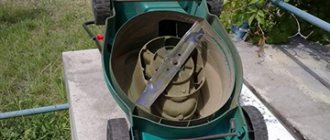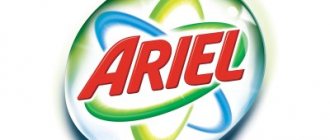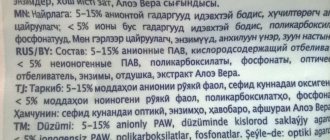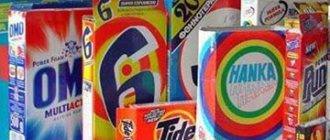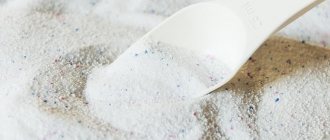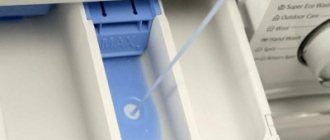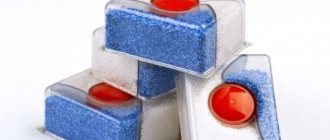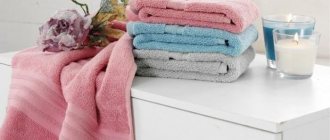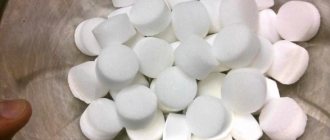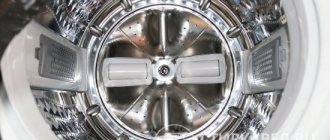Among household chemical goods that are produced industrially, there is a large assortment of washing detergents. They come in various forms.
An alternative option is to prepare the laundry detergent yourself at home.
We will tell you in this article how to make washing powder with your own hands from available ingredients.
Advantages and disadvantages of funds
Laundry detergents that you make yourself have many advantages over ready-made ones.
Their main advantages include:
- Natural composition in which you can be 100% sure.
- Safety, reducing the likelihood of allergic reactions.
- Low cost.
- Universal composition.
- Easy to use.
The negative points are the following factors:
- It takes time to prepare.
- Containers are needed for mixing the components and for storing the finished product. You will also need a spoon for stirring, a grater for grinding soap, and a measuring cup.
- All ingredients are needed in sufficient quantity.
- Not all components of natural products rinse well, especially those that contain laundry soap.
- Most homemade medications make the tissue stiff.
Homemade products are more demanding in terms of storage conditions than commercially manufactured products.
The most harmful elements of factory powders
Phosphates are a particular danger in industrial mixtures.
Microparticles that form the basis of industrial detergent products are quite toxic and can have a destructive effect on the human body.
Phosphates are particularly dangerous in industrial mixtures. When they get on the fabric during washing, they are not washed out completely even after several rinses.
The composition of the factory consistencies includes:
- aggressive surfactants;
- sulfates;
- chlorine;
- peroxide;
- sodium silicate;
- enzymes and other chemical compounds.
Constant human contact with toxic elements causes skin irritation, itching, allergic reactions, affects the functioning of the respiratory and urinary systems, and reduces immunity.
Do-it-yourself washing powder for an automatic washing machine is the best alternative to store-bought detergent.
Rules of application
The use of homemade laundry detergents has its own characteristics. They are related to the consistency of the product and composition.
Machine washable
The amount of preparation for machine washing is 1 cup of dry or liquid washing powder based on a standard load (up to 5 kg of items). For slightly soiled clothing, half the dose is sufficient.
The method of application depends on the consistency of the product:
- If the powder turns out to be fine-grained, then the product can be poured into the dishwasher of the washing machine.
- If the texture of the powder is coarse, then it is advisable to first dilute the preparation with a little water, or immediately place it in the drum of the machine.
- Liquid powders can be poured both into the drum and into the powder compartment.
The use of washing soap powders, especially coarsely grated ones, can lead to incomplete dissolution. Such preparations may also be difficult to rinse out. When washing at low temperatures, homemade soap powders may be ineffective.
Manual processing
For hand washing, the amount of detergent is measured to be half that required for automatic processing.
In this case, you must proceed as follows:
- collect approximately 10 liters of water in a basin;
- dilute the powder;
- start washing.
Liquid products and fine-grained powder dissolve in water faster than products based on large chips.
Required Ingredients
How to make washing powder at home? It's not difficult at all. Moreover, all the necessary components are available. You can find them at home or purchase them without any problems - they are cheap and not in short supply. The basis of such products is soda and soap. But the addition of other ingredients is additionally required. Here's everything you might need.
Soap shavings . Any solid soap is suitable for making it. You can even use accumulated soap from various soap bars. But it is still preferable to use brown laundry soap, without aromatization, preservatives and bleaching effect, to prepare a detergent. It has a softening effect on fabric fibers and does not cause allergies. Whatever soap you use - baby soap, laundry soap, toilet soap - it is advisable to pre-dry it. To do this, the bar should be freed from its wrapper and placed in the sun or in close proximity to a heat source.- Soda . You can use both food-grade and calcined versions. The first of them has a milder effect. When working with the second one, you need to protect the skin of your hands with rubber gloves. Kitchen soda has a mild bleaching effect, eliminates odors, cleans and disinfects fabric without harming its fibers.
- Soda ash is the basis of an expensive product known under the trade name "Calgon". Its main function is to soften excessively hard water. But not everywhere tap water has such characteristics. And therefore there is not always a need for this remedy. Moreover, it is not so effective against scale. If you use it regularly, this will affect the condition of the items being washed. Soda ash damages fibers over time, although it effectively copes with even stubborn and old stains.
- Borax . It can be found in a pharmacy, cosmetics store, or among soap-making supplies. This compound is a salt of boric acid. It has disinfecting and cleansing properties. Borax destroys not only bacterial organisms, but also fungal parasites. It is ideal for washing children's clothes.
- Mustard powder . The ability of dry mustard to cope with many contaminants has been known for a long time. In addition, it has an antiseptic effect, which will never be superfluous when washing. Traces of mustard are easily rinsed out and therefore will not cause any skin reactions. This component should not be used in washing machines. A swollen mustard mass can clog the pipes.
- Essential oil . This component is optional. But if you are not allergic to such additives, their presence in the homemade powder will be highly desirable. Firstly, they act as a natural flavoring agent. If 72% washing soap was used as a base, the smell of which can hardly be called pleasant, it will be difficult to do without fragrance. Instead of ethereal extract, you can also use, for example, perfume. And secondly, essential additives create additional effects: tea tree - disinfects, lavender - soothes, mint - normalizes appetite, etc.
- Lemon acid . This component helps get rid of some types of stains. In addition, under its influence the fabric fibers are softened, color fading is prevented, and the linen acquires a fresh smell. Also, the citric acid additive dissolves scale, helping to clean the washing machine.
- Vinegar . Table vinegar has the same effect on clothes as citric acid. But it can damage machine parts, so it should be used with caution when machine washing. As for wine vinegar, adding it when rinsing helps prevent the appearance of whitish spots on colored fabrics after drying.
How to store?
A prerequisite for storing detergents is tightly closed packaging and protection from children and animals. Liquid products are best stored in the refrigerator, dry products can be kept at room temperature.
Since the composition does not contain anti-caking ingredients or to maintain the consistency of the product, it is advisable not to make large reserves - otherwise the powder may disappear .
The shelf life of a dry product that is pre-dried and stored under a lid and in a dark place is up to three years.
For liquid mixtures, the shelf life is much shorter - up to a month, when stored in a cool, dark place. Violating the rules for storing a home remedy can lead to its damage.
How to replace surfactants?
The main function of the detergent composition is cleansing from contaminants , but harmlessness is also important.
Eco-friendly substances suitable for washing are available in almost every home. The main element of a homemade solution is soap.
The important ingredients are baking soda and acetic acid. Other inexpensive substances can be purchased in the hardware section of the supermarket or pharmacy. These include borax and soda ash.
Natural structures do not have allergens or synthetic impurities. The self-prepared concentrate does not remain on fabric particles, but is easily washed off when rinsing.
To make your own cleaning mixes you will need bowls, a grater and large glass containers.
Necessary Precautions
Self-created washing powder must be hypoallergenic - this is why most housewives make it. However, the “production” process can be inconvenient. When mixed, tiny particles of ingredients (for example, soda) can enter the respiratory tract, causing a sore throat, tracheal irritation, and bronchospasm. To avoid this, it is necessary to cover your mouth and nose with a medical mask while working.
The negative consequences of using vinegar can be even stronger - even causing a chemical burn. When working with acids (in particular, when they are combined with alkaline components), you must protect yourself with a respirator. Medical gloves must be used. It is also advisable to cover your eyes with special glasses that fit tightly to the skin of your face.
Harm from store-bought household chemicals
If you are still wondering whether to make the powder yourself or not, we suggest that you familiarize yourself with the list of disadvantages of household chemicals from the store.
- The main components of purchased powders are surfactants and phosphates. Even a few rinses cannot completely remove them from clothes.
- Surfactants very often cause allergies, which are especially severe in young children.
- Phosphates are toxic, absorbed through the skin into the blood, they inhibit the functioning of the kidneys and liver.
- Various bleaches, sodium silicate and other harmful ingredients weaken the immune system, leading to dermatoses, allergies, and dry skin.
Everyone decides for themselves whether to use household chemicals from the store or not. However, many women have long forgotten about the problem of “how to wash clothes” and successfully use a home remedy.
Possible reasons for home experiments
The appearance of an infant in the home
The first and main reason to start creating your own powder.
The delicate skin of a baby may not react in the best way to the use of purchased chemicals (even special, hypoallergenic ones). In such cases, mothers only have baby soap, but hand washing in large volumes is an energy-consuming process.
The simplest washing powder can be made from the same soap using a kitchen grater. Several bars without additives are ground into powder, poured into a dry, clean, tightly closed jar - and used as needed (2-3 tablespoons per wash).
The appearance of skin irritation
The second significant reason is an allergic reaction, asthmatic manifestations in the housewife herself when using purchased products.
Cheapness
An important point is the difference in the cost of proprietary chemicals and homemade powders. The latter turn out to be much cheaper, demonstrating the same (or even higher) efficiency.
Cooking options
There are many methods for making your own laundry detergent. A number of them have been used for a long time and are known to experienced housewives. There are three most popular compositions. Even if you do not strictly follow the proportions of ingredients, the washing result will not suffer.
The first classic recipe involves cooking with soap, soda and borax. You need to take:
- one and a half cups of soap crumbs;
- 250 mg soda ash;
- 100 g baking soda;
- 200 g borax;
- 15 drops of tea tree or citrus oil.
Another, more simplified recipe uses baking soda and soap. It involves the use of 300 mg of soda ash, one and a half glasses of soap crumbs, two glasses of baking soda, 15 drops of essential oil.
To prepare children's washing powder, mix 150 g of soap shavings, 200 g of borax, 500 g of soda, 5 drops of tea tree.
Crushed soap crumbs are made by grating a bar of soap. You can use a larger grater to save less effort. Additionally, you can grind it in a blender. Mix all components one by one. These are soap crumbs, soda - any kind, ethereal compounds, borax. Mix thoroughly and place in a glass or plastic container, cover tightly with a lid and store in a cool, dry place. To use ready-made powder in an automatic machine, you need to rub the soap finely, otherwise soap stains will form on things.

